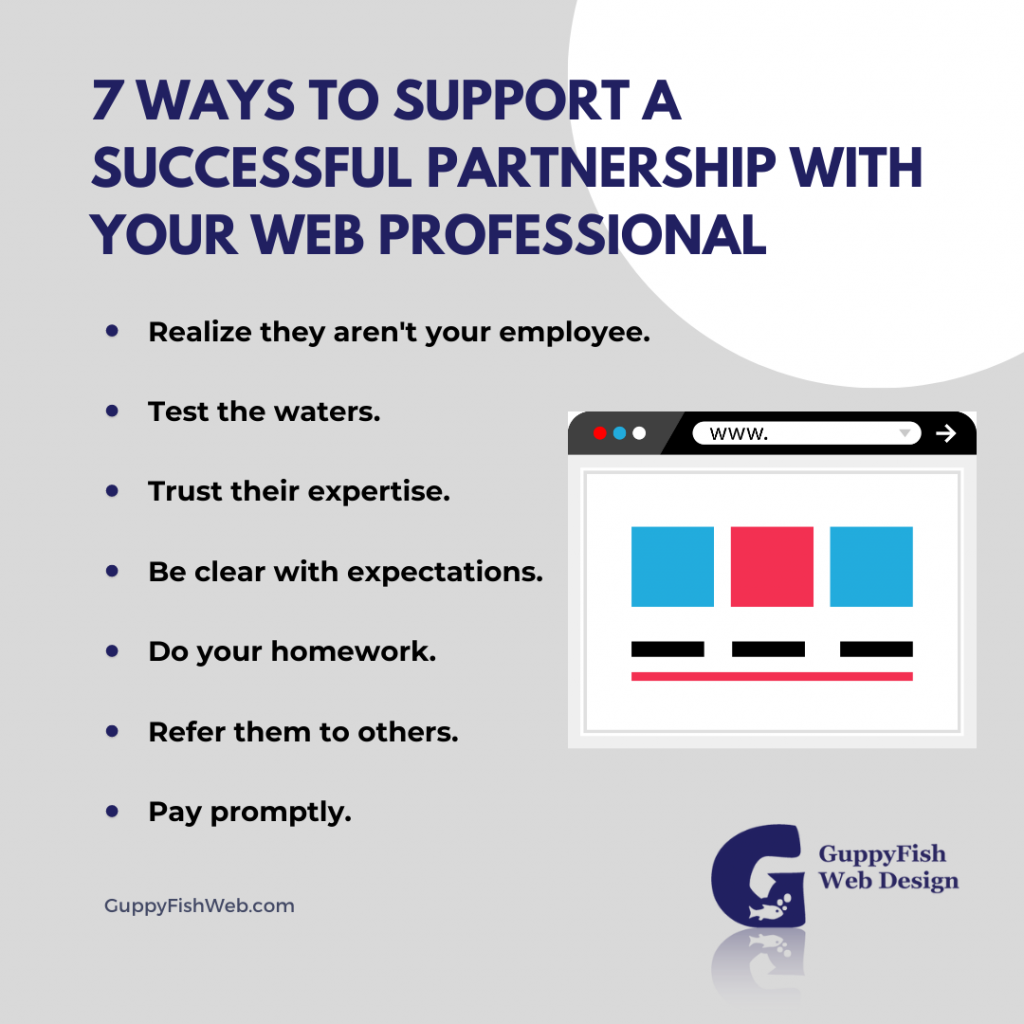For many years, I’ve wanted to write a “What your Web Professional is too Scared to Tell You” post. It’s molded itself and taken shape in my brain. It hasn’t always been very friendly, but it would be brutally honest. I realized that what we really want, at the end of the day, is to be seen as a partner.
There are some really bad web folks out there. When you find a great one, you want to do everything you can to hold on to that person. Here’s how…
Realize a web professional isn’t your employee.
Regardless what they do for you, be it a website, email, or social media, this person is NOT your employee. The only exception is when you have an in-house person who works solely for you. If you hire a freelancer or an agency, you should consider them a partner with you, not someone who works for you. Treat them accordingly. You do not get a say in their time off, meal breaks, or schedule. If they communicate with you and keep the project on schedule, that’s all you need to worry about.
Additionally, this person has other projects and commitments. Yes, I want my clients to feel like the only ones I have. That doesn’t make it true, however. Understand that your web professional has other clients, a family, and a life. They are not at your beck and call.

Test the waters.
You may feel leery about jumping into an expensive, long-term contract with someone you barely know. For that reason, consider asking about smaller projects. I offer prospects the chance to do a Roadmapping Session as a chance to test the working relationship. Remember, the partnership has to be a good fit in both directions. They want someone they click with just as badly as you do. If we work well together, we move forward with a larger commitment. If not, we go our separate ways, having lost very little in the way of time and money.
Trust your web professional’s expertise.
When you win, your web professional does, too. They want you to succeed. For that reason, it only makes sense that you should trust them to give you the best advice. They know their craft, and they don’t want to steer you wrong. For the same reason that you don’t want someone coming in and questioning your every move, you shouldn’t do that to them.
In short, don’t micromanage and push back on every recommendation.
Be clear with expectations.
When I asked colleagues on Twitter to weigh in on this question, respondents Roy Sarkar and Adam McLaughlin listed clear expectations as imperative to maintaining a good relationship with your web professional. This clarity should carry throughout the entire project. A few examples:
Project Start
What goals do you have for the project? What business or organizational goals do you hope to move forward as a result? Any web professional worth his or her fee should ask upfront and offer solutions directly related to your goals. If they offer something cool or trendy that doesn’t directly help your goals, they are probably just showing off. If you make those goals clear and specific from the very beginning, they can tailor solutions toward them.
Project Feedback
When you give feedback, be as clear as possible. Ambiguous feedback is almost worse than no feedback at all. I’d be a happy person if I never heard any version of these again:
- Make it pop!
- Something just isn’t right.
- I’ll know what I like when I see it, but this isn’t it.
What the &*$% am I supposed to do with that? Tell me specifically what you’d like to see, and I’ll do my best to make it happen. Otherwise, we’ll both feel frustrated.
On the other hand, make your positive feedback clear and specific, too. We love to hear “I love this!” as much as anyone else, but saying specifically what you love will go a long way toward motivating us. Saying “The layout of this page is so clean!” is so much clearer than just saying you like it.

Do your homework.
Any successful project requires both parties to participate. If your web professional asks you for content, graphics, text, or anything else, provide it in a timely manner. More website delays occur from waiting for the client than any other reason.
Refer them to others.
One thing I tell my clients at the beginning of projects is that I’d prefer use my time making their website the best it can be rather than networking. (This is part of an automated series I use for onboarding.) They can help me use that time more wisely by referring me to someone they think can use my services. It may sound cliché, but a referral is truly the best compliment you can give.
Pay your web professional promptly.
Seriously. Just pay your invoice. You don’t give your regular employees their paychecks late, so don’t do that to your web professional. I promise that we are most motivated to do an awesome job for clients who show they respect us by paying on time.
Once you find someone who listens to you and wants you to succeed, you don’t want them to label you a bad client and run away screaming. So treat your web professional well, and keep swimming along!

0 Comments